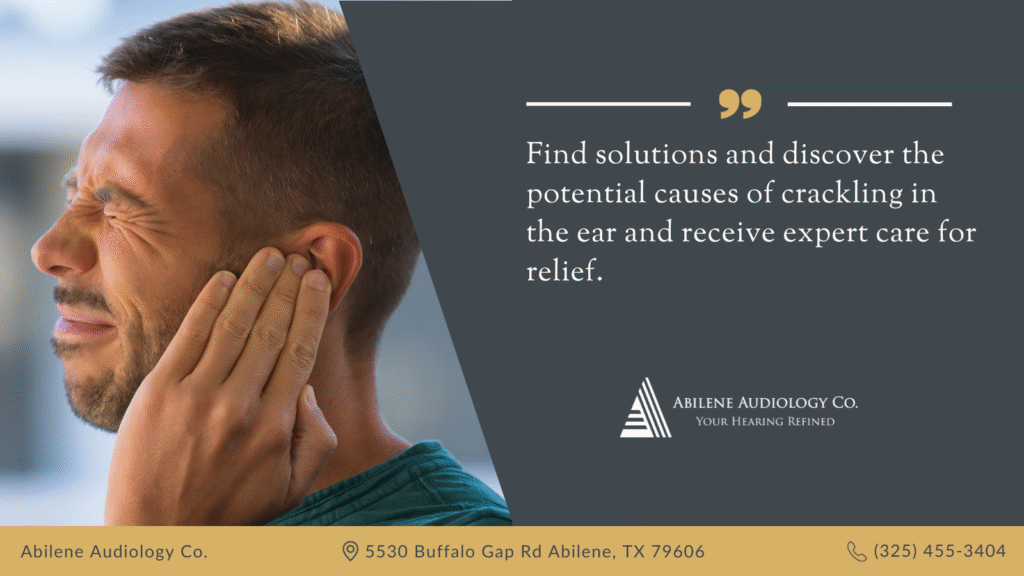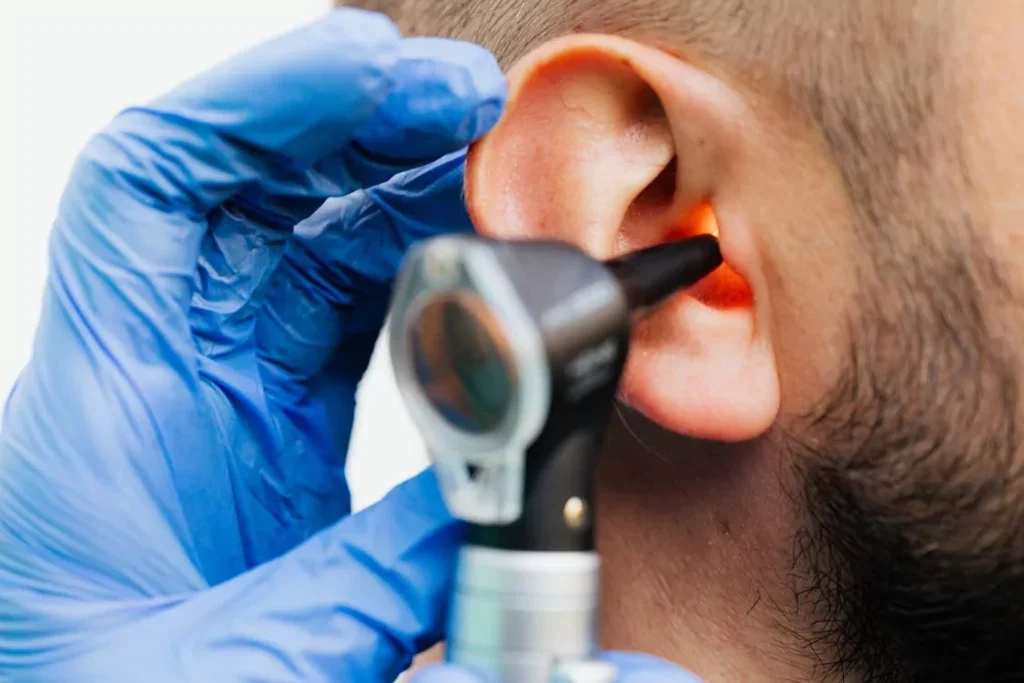Introduction
Hearing a strange crackling or popping sound in your ear can be both annoying and worrying. Many people experience it occasionally, especially when swallowing, yawning, or during changes in air pressure, such as flying. Most of the time, these sounds are harmless and temporary, but sometimes they can signal an underlying ear issue that needs attention.
The ear is a delicate organ made up of tiny structures that manage hearing and balance. Even a small disturbance in these parts can cause unusual sensations or sounds. In this detailed guide, we’ll explain the possible reasons for ear crackling, what you can safely try at home, when to visit a doctor, and how to prevent it from coming back. This article is written to be clear, medically accurate, and easy to follow — focused on helping you understand your symptoms and take the right steps toward relief.

What Is the Crackling Sound in the Ear?
A crackling sound in your ear feels like tiny pops, snaps, or clicks coming from inside. It may happen when you swallow, chew, talk, or even sit quietly. Some describe it like the sound of “Rice Krispies” in the ear.
This sound usually happens because air, wax, or fluid moves around inside your ear or because certain small muscles near the ear twitch. Although it might sound strange, it’s often a sign that something inside your ear system — such as the eustachian tube, jaw joint, or wax buildup — is temporarily out of balance.
Read More: What is Ear Crackling and What Can I Do About It?
Main Causes of Crackling Sound in the Ear
1. Earwax Buildup or Impaction
Earwax protects your ear by trapping dirt and preventing infection. However, too much wax can become hard and press against the ear canal or eardrum. When this happens, you might hear crackling noises, especially when moving your jaw.
Trying to remove earwax with cotton swabs often makes things worse by pushing it deeper. Instead, use ear drops to soften wax or let a professional clean it safely.
2. Eustachian Tube Dysfunction (ETD)
The eustachian tube connects your middle ear to the back of your throat. Its job is to equalize pressure and drain fluid. When it’s blocked due to allergies, sinus congestion, colds, or inflammation, air gets trapped, causing a popping or crackling sensation.
ETD is one of the most common causes of ear crackling. You might also feel fullness in the ear, muffled hearing, or a sense that your ear needs to “pop.” It can worsen during altitude changes, like in airplanes or elevators.
3. Middle Ear Infection or Fluid (Otitis Media)
When an infection develops behind the eardrum, fluid builds up and can move around as you change positions, creating a crackling sound. You may also feel pain, pressure, or temporary hearing loss.
Children are especially prone to this, but adults can experience it after a cold, sinus infection, or allergy flare-up. In most cases, infections clear with rest and medication, but persistent fluid buildup may need medical treatment.
4. Muscle Spasms in the Ear
Inside your ear are two small muscles — the tensor tympani and stapedius — which protect your hearing by reacting to loud sounds. Occasionally, these muscles can spasm involuntarily (called middle ear myoclonus), producing rhythmic clicking or crackling.
This is harmless but can be irritating. Stress, fatigue, caffeine, or certain neurological conditions can trigger or worsen it. Managing stress and getting enough rest often help, though in rare cases, a doctor may recommend medication.

5. Temporomandibular Joint (TMJ) Disorders
The jaw joint (TMJ) sits very close to the ear. When you clench your jaw, grind your teeth, or have misalignment, the movement can create vibrations that feel like popping or crackling in the ear.
People with TMJ issues might also notice jaw pain, stiffness, or headaches. If your ear crackling occurs when chewing or talking, TMJ could be the cause.
6. Changes in Air Pressure
Pressure changes during flying, diving, or driving through mountains can make your ears feel clogged or create popping sounds. When the eustachian tube can’t equalize pressure quickly enough, air shifts inside the middle ear cause crackling.
This usually resolves on its own after swallowing, yawning, or performing the “Valsalva maneuver” (gently blowing with your nose pinched).
7. Ruptured or Perforated Eardrum
If you’ve recently had an ear infection, injury, or exposure to very loud noise, the eardrum might have a small tear. This can lead to popping, crackling, or a whistling sound as air passes through the hole.
Other signs include ear pain, discharge, and hearing loss. Always seek medical help if you suspect a rupture — it usually heals but may require care to avoid infection.
8. Meniere’s Disease or Inner Ear Disorders
In some rare cases, crackling in the ear is linked with inner ear conditions like Meniere’s disease. This disorder affects balance and hearing, causing symptoms such as tinnitus (ringing), dizziness, and fullness in the ear.
If crackling comes with spinning sensations or fluctuating hearing, see an ENT specialist for evaluation.
How to Stop Crackling in the Ear
1. Swallowing, Yawning, or Chewing Gum
These natural movements help open the eustachian tubes, letting air flow and pressure equalize. This often relieves temporary crackling.
2. Perform the Valsalva Maneuver (Carefully)
Close your mouth, pinch your nose, and gently blow out as if trying to exhale through your closed nostrils. This can pop open blocked eustachian tubes. Avoid doing it too forcefully to prevent eardrum injury.
3. Use Warm Compresses
Applying a warm towel or heating pad (low setting) over the affected ear can reduce pain and improve fluid drainage, especially if you have congestion or mild infection.
4. Try Ear Drops or Wax Softening Solutions
Over-the-counter ear drops can help soften hardened wax, allowing it to clear naturally. Avoid inserting anything into the ear canal.
5. Manage Nasal Congestion
Since eustachian tubes connect to the nose, treating sinus congestion with steam inhalation, saline nasal spray, or antihistamines (for allergies) can help relieve crackling.

6. Stay Hydrated and Use a Humidifier
Dry air and dehydration can worsen congestion and make your eustachian tubes sticky. Drinking enough water and using a humidifier keep your nasal and ear passages moist.
7. Avoid Loud Noises and Ear Trauma
Repeated exposure to loud sounds or frequent ear cleaning can irritate delicate ear tissues. Always handle your ears gently and protect them in noisy environments.
8. TMJ Exercises and Relaxation
If your ear crackling is linked to jaw tension, practice gentle stretching or relaxation techniques. Avoid chewing gum excessively or clenching your jaw.
Medical Treatments for Persistent Ear Crackling
If symptoms last more than a week or come with pain, hearing loss, or discharge, it’s time to see a healthcare professional. Depending on the cause, they may suggest:
- Earwax removal using suction or irrigation
- Prescription drops or antibiotics for infection
- Decongestants or nasal steroids for sinus and allergy-related ETD
- Ear tubes (grommets) for chronic middle ear pressure or fluid
- Balloon dilation of the eustachian tube (a minor procedure to open blockages)
- Physical therapy or bite guards for TMJ disorders
- Surgery or repair for severe eardrum or structural problems
Always avoid inserting objects or trying risky home remedies — the ear is sensitive and easily damaged.
When to See a Doctor
Contact an ENT (ear, nose, and throat) specialist if:
- Crackling lasts longer than a week
- There’s ear pain, discharge, or dizziness
- Hearing feels muffled or decreased
- You recently had a cold, sinus infection, or flight and the feeling won’t go away
- You suspect a perforated eardrum or have sudden hearing loss
A doctor will examine your ear canal and eardrum, possibly using tests like tympanometry or audiometry to find the root cause.

Prevention Tips
Keeping your ears healthy can prevent many causes of crackling. Try these habits:
- Clean ears safely – Use a damp cloth, not cotton swabs, and let wax clear naturally.
- Treat allergies and sinus problems early – Don’t let congestion build up.
- Stay hydrated – Fluids keep the eustachian tubes functioning smoothly.
- Avoid smoking and secondhand smoke – These can irritate ear tissues.
- Protect ears from loud noise – Use earplugs when needed.
- Manage stress – Reducing tension can help prevent muscle spasms.
- Maintain good jaw posture – Avoid grinding teeth or constant gum chewing.
FAQs
1. Why does my ear crackle only when I swallow or yawn?
This happens because swallowing or yawning opens the eustachian tubes. If they’re slightly blocked by mucus or inflammation, air shifts and creates a crackling sound.
2. Can earwax cause crackling sounds?
Yes. Hardened or impacted earwax can press against the eardrum or block airflow, leading to crackling or popping sensations when moving your jaw or talking.
3. How long should ear crackling last before I see a doctor?
If the crackling lasts more than seven days, or if you notice pain, fluid, dizziness, or hearing loss, it’s time to get checked by an ENT specialist.
4. Can stress make the crackling sound worse?
In some cases, yes. Stress can trigger muscle tension or spasms in the ear or jaw, which may cause or worsen the crackling.
5. Is the crackling sound dangerous?
Most of the time, it’s harmless and temporary. However, persistent or painful crackling could indicate ear infection, eustachian tube dysfunction, or other conditions that need medical care.
Read More: How to Get Rid of Dandruff Fast and Effectively
Conclusion
A crackling sound in your ear is usually a minor issue caused by earwax, pressure changes, or temporary congestion. However, it can also signal problems like eustachian tube blockage, infection, or TMJ disorders. Most cases improve with simple self-care — swallowing, yawning, warm compresses, and keeping nasal passages clear. Avoid cleaning your ears with objects, which can push wax deeper or damage the eardrum.
If the noise persists, is accompanied by pain, hearing loss, or dizziness, don’t ignore it — see a healthcare professional for a proper diagnosis. With prompt care and a few lifestyle adjustments, you can prevent recurring episodes and keep your ears healthy and comfortable. Remember, your ears are delicate; treat them with care, and they’ll continue to serve you well in hearing the world clearly and without unwanted crackles.